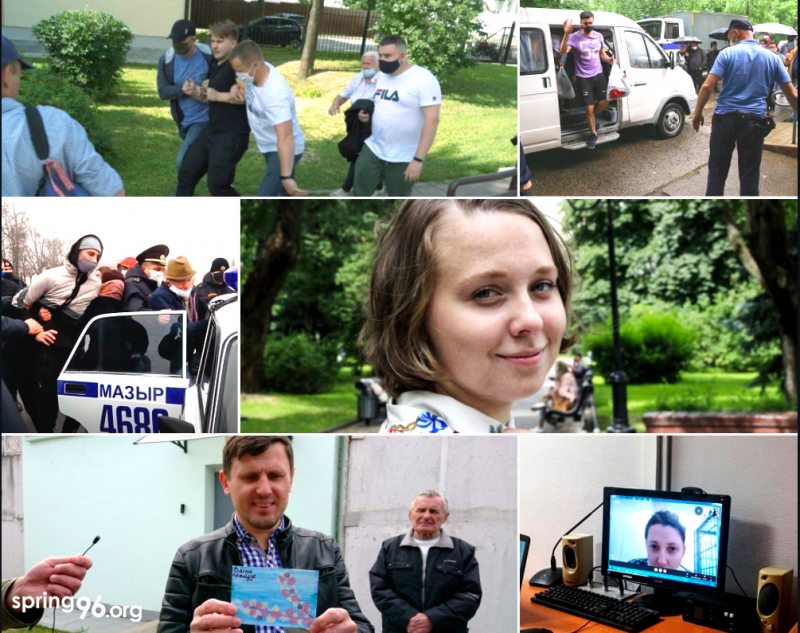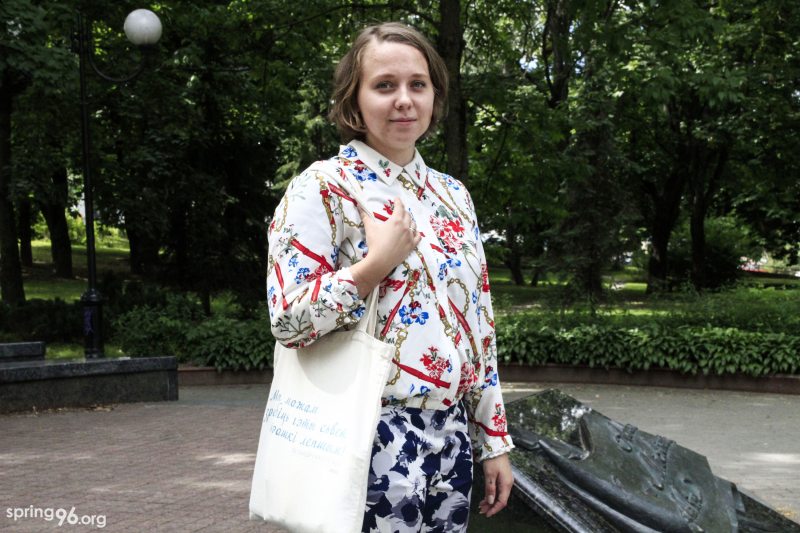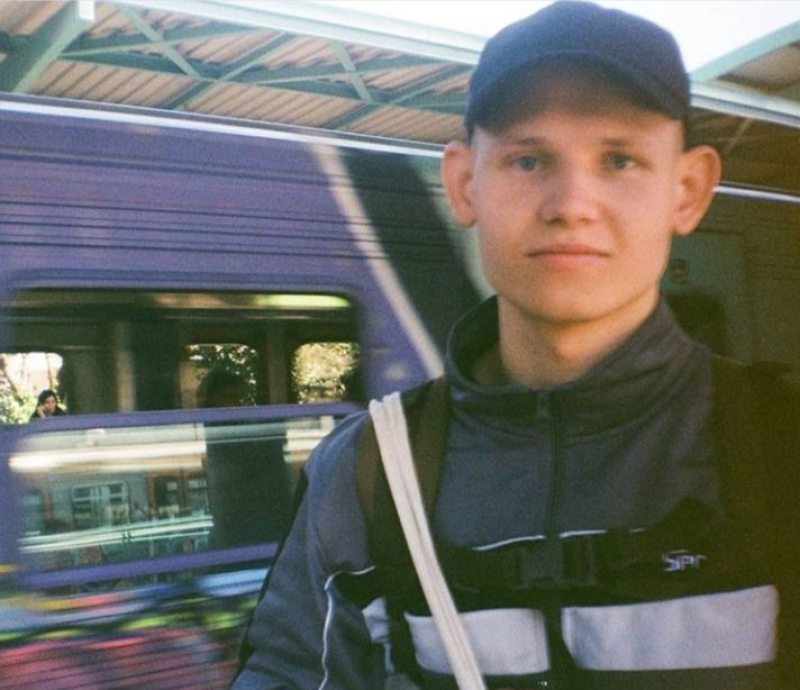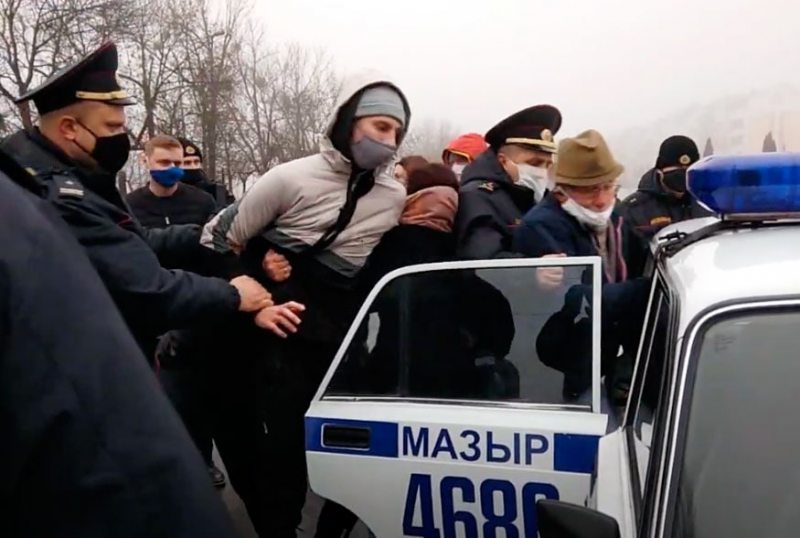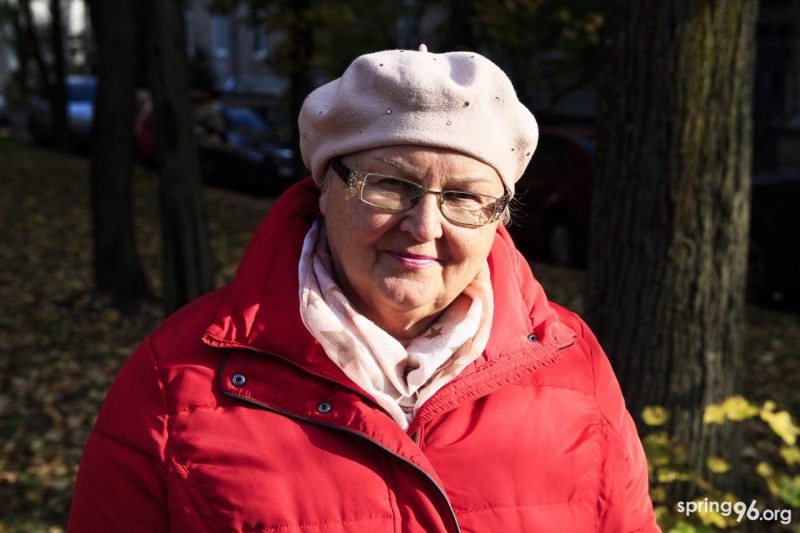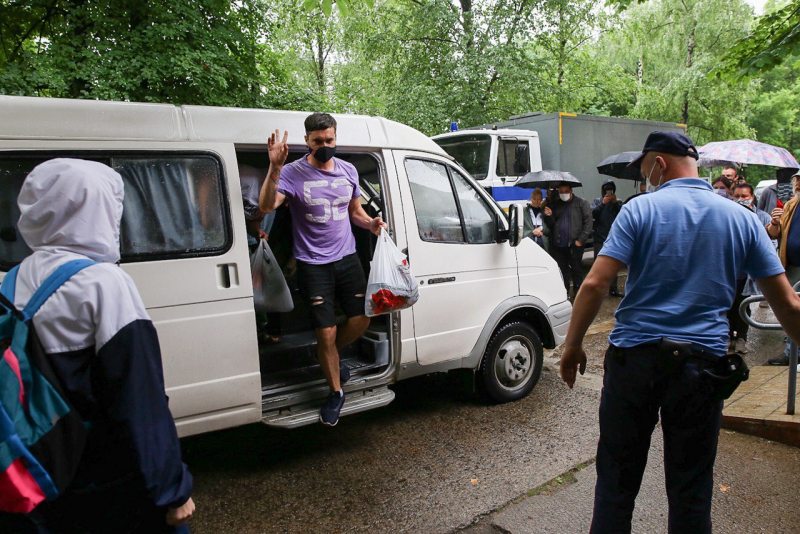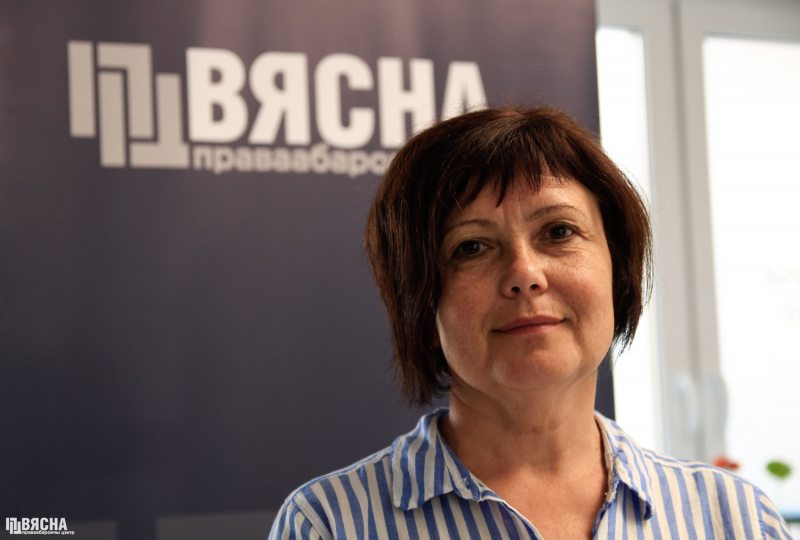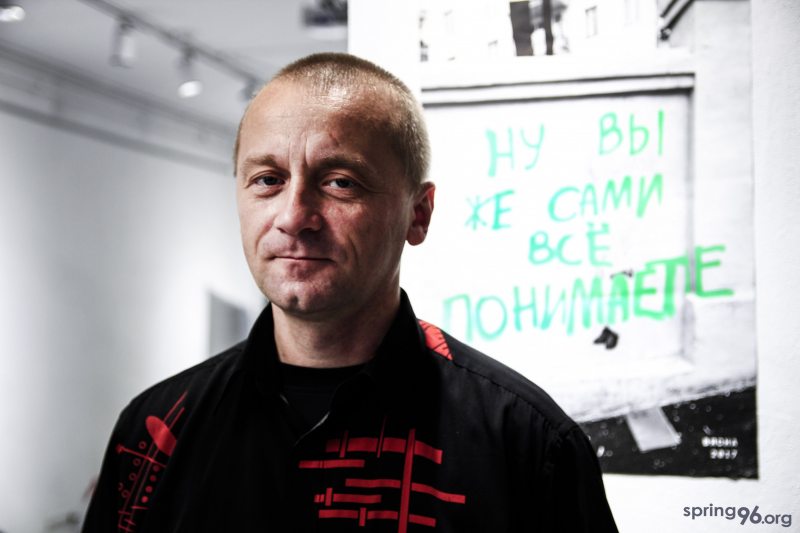Repression against "Viasna" human rights defenders: Increase in persecution before and after election
In 2020, some 20 members and volunteers of the Human Rights Center "Viasna" were persecuted and repressed. Although they carry out entirely peaceful human rights activities, Viasna staff are persecuted by the state in various ways: arrests on flimsy pretexts, administrative and criminal persecution, searches, trials, and other forms of pressure. Repression intensified during and after the presidential election: observers of the "Human Rights Defenders for Free Elections" campaign were sentenced to administrative arrests; at the moment, two Viasna affiliates are kept in a pre-trial detention center and accused of participation in or financing "mass riots". There is no doubt that this pressure is put on them for the human rights activities they carry out in Belarus to intimidate the organization and the Belarusian human rights and civil society in general.
Chairman of the Human Rights Center "Viasna" Ales Bialiatski says that the Belarusian authorities have started a real war against the Belarusian people this year.
"Viasna human rights defenders bravely fight for human rights in these settings, they get repressed and persecuted. But they cannot stop us!" Ales Bialiatski states.
Here is how the Belarusian authorities persecute our colleagues.
Two Viasna activists are behind bars under criminal charges
At present, Marfa Rabkova, coordinator of Viasna's Volunteer Service, and Andrei Chapiuk, a Viasna volunteer, are in custody on the accusation connected with "mass riots". The human rights community in Belarus declared them political prisoners, and the international human rights organization Amnesty International recognized them as prisoners of conscience. Both are held in pre-trial detention center #1 in Minsk.
Marfa Rabkova, coordinator of the Volunteer Service of the Human Rights Center "Viasna" was detained on September 17 in Minsk together with her husband when she was returning from the ceremony of awarding "Viasna" with the Polish Jan Karski Eagle Award.
She was charged under part 3 of Article 293 of the Criminal Code (training or other preparation of persons to participate in mass riots or financing such activities). She faces arrest or imprisonment for up to three years. UN Special rapporteurs and several international organizations made a stand for Marfa and called on the Belarusian authorities to immediately release her. Amnesty International announced an urgent action supporting these demands.
Viasna volunteer Andrei Chapiuk was detained on October 2, two weeks after the detention of Marfa. He is accused of participation in "mass riots" under part 2 of Article 293 of the Criminal Code.
On August 31, Pavel Harbuz, another Viasna volunteer, was also detained under this article. But they could not charge him – Pavel was released 10 days later. Pavel Harbuz left Belarus for his family's safety reasons.
All three arrests of Viasna's affiliates under criminal charges of "mass riots" were carried out by the Main Directorate for Combating Organized Crime and Corruption officers. After leaving the country, Pavel Harbuz spoke about threats against all Viasna human rights defenders which he had heard from the agency's staff. They promised that they would soon arrest all members of the organization and put an end to its activities.
According to Belarusian human rights activists, all activities of detained Marfa Rabkova and Viasna volunteers Andrei Chapiuk and Pavel Harbuz were entirely peaceful and human rights-oriented and were aimed at assisting people who suffer for their political views and beliefs and the protection of human rights in Belarus. Their persecution is regarded as a continuation of the campaign of intimidation and pressure on members of the "Viasna" human rights center and the entire human rights community in the country.
Persecution of human rights defenders under the "popular" Article 23.34 of the Code of Administrative Offenses
The most common way for the authorities to put pressure on members and volunteers of the organization is to penalize them under administrative law – the "popular offense" under art. 23.34 CAO (participation in an unauthorized mass event). The court punishes "Viasna" activists for monitoring peaceful assemblies or false claims that they took part in rallies.
Thus, on November 2, independent journalist and human rights activist of Viasna Maryna Kastylianchanka was sentenced to 15 days of arrest under this article. Zavodski District Court accused her of allegedly taking part in an unauthorized mass event and of disobeying police officers during her arrest. On October 30, the human rights activist was detained by the Main Directorate for Combating Organized Crime and Corruption officers in a cafe together with seven other people. In fact, she took no part in an unauthorized protest that day at the place specified in the detention report and therefore, she did not commit any offense. At the trial, Maryna described the charges against her as complete fiction.
Viasna human rights activists consider the detention to be arbitrary and illegal. International human rights organization Front Line Defenders called on the Belarusian authorities to immediately and unconditionally release Viasna journalist and human rights activist Maryna Kastylianchanka, and to drop all charges.
But on November 14, after serving a 15-day arrest, Maryna Kastylianchanka did not leave Baranavičy detention center. Local policemen informed the relatives of the human rights activist that she had been detained again on administrative charges. The Main Directorate for Combating Organized Crime and Corruption officers sent a report half an hour before the release of the journalist stating that Maryna allegedly had taken part in an unauthorized mass event on October 25 at Partyzanski Avenue in Minsk. However, no protest took place there that day. On November 17, Mikalai Kmita, the judge of the Baranavičy City and District Court, sentenced the human rights defender to 15 days of administrative arrest. The trial took place within the walls of the detention center and there was no possibility to attend it for monitoring. In fact, it was a closed court session. The authorities call it an "off-site" trial. Thus, the human rights activist would serve a total of 30 days under arrest.
On November 15, Uladzimir Tseliapun, a Viasna human rights defender, was brutally detained in Mazyr at the action in memory of Raman Bandarenka killed in Minsk. He was taken to the District Department of Internal Affairs, where policemen drew up an administrative offense report under Article 23.34 of the Code of Administrative Offences and took him to the detention center until the trial. However, later that day he was informed that they would not detain him for longer and would summon him to court.
On November 14, Viasna human rights activist Ales Dzerhachou was detained in Smarhoń allegedly for participation in an unauthorized protest action. He was held for 72 hours in a local detention center and released. According to Viasna's Hrodna office, Ales Dzerhachou was charged with staying among people with balloons on November 8 in Smarhoń. The head of the Smarhoń detention center told Dzerhachou that his case was not examined on Monday because they knew that he always required to conduct the administrative trial in Belarusian, and the court was not prepared for it.
On November 6, Viasna volunteer Katsiaryna Chkhartsishvili was sentenced to 5 days of administrative arrest under Article 23.34 of the Code of Administrative Offenses. She was accused of taking part in an unauthorized mass event near the house of well-known activist Nina Bahinskaya. In the evening of November 5, people came to Nina Bahinskaya's house that was being searched. That night, riot policemen detained 10 people in the yard, including Katsiaryna. At the trial, the volunteer said that she was walking along Kolas Street that evening. She saw people who did not shout any slogans, they had no flags or posters. That was where she was detained by riot policemen and taken to a police van.
Tamara Shchapiotkina, a human rights activist from Biaroza, was accused of participation in the protest that took place on August 10. She was detained on August 12 when she was copying the names and recording the stories of those detained on the night of August 9-10, interrogating relatives who came to the police to find out their whereabouts and bring some food and clothes. Biaroza District Court accused her of participation in the action, although the videotape shows that Tamara was returning home in the evening and took the road next to the square where the protesters were gathering. Despite that, the court fined her 810 rubles.
On May 15, the Leninski District Court of Mahilioŭ sentenced Viasna human rights activist Ales Burakou to 10 days of administrative arrest under Article 23.34 of the Code of Administrative Offences for his alleged participation in the action at the local detention center on May 6. In fact, the human rights activist met and recorded interviews with people who were released from the detention facility.
On May 12 and 15, Viasna human rights activist from Brest Uladzimir Vialichkin was tried twice under Art. 23.34 of the Code of Administrative Offences for monitoring traditional protests against the car battery factory known as "feeding pigeons". Uladzimir also experienced arbitrary detentions. He spent five days in detention before the trial.
The persecution of Viasna human rights defenders under Article 23.34 of the Code of Administrative Offenses was the most widespread method during the election campaign when the activity of human rights defenders was even more visible due to the "Human Rights Defenders for Free Elections" campaign.
Persecution of Viasna activists during the election observation as part of the "Human Rights Defenders for Free Elections" campaign
Since 2008, Viasna human rights defenders, together with the human rights defenders from the Belarusian Helsinki Committee, have been independently observing elections in Belarus. The 2020 presidential election campaign has become the most dangerous in terms of the level of the repression against observers.
The "Viasna" human rights activist from Babrujsk, journalist Siarhei Latsinski, experienced pressure from the authorities due to his participation in the independent election observation campaign "Human Rights Defenders for Free Elections". On June 19, during a pre-election picketing event, police officers detained Siarhei Latsinski. He had a press card issued by Bobr.by (an internet portal in Babrujsk) with him. He spent three days in a detention facility, and on June 22, the court sentenced Siarhei to 10 days of arrest under Art. 23.34 of the Code of Administrative Offences.
Representatives of "Human Rights Defenders for Free Elections" adopted a statement emphasizing that all observers who had been accused of allegedly participating in unauthorized mass events were there to carry out legitimate election observation activities, including mass events taking place as part of the election campaign. Human rights defenders demanded that the Belarusian authorities immediately cease the administrative persecution of independent observers of "Human Rights Defenders for Free Elections", in particular Siarhei Latsinski.
Two campaign observers and members of "Viasna" Human Rights Center from Mahilioŭ, Aliaksandr Burakou and Ales Burakou (Jr.), were also subjected to pressure. They were sentenced on August 7 to ten days each on far-fetched and illegal grounds. On the evening of August 5, a provocation was made against Aliaksandr Burakou near the building of the Leninski District Department of Internal Affairs in Mahilioŭ. Ales Burakou was convicted for his participation in the action which took place in Mahilioŭ on July 14 – on that day, the CEC (Central Election Commission) announced that Viktar Babaryka and Valery Tsapkala had been denied registration as candidates for the elections. According to the police, Ales Burakou participated in an unauthorized event and clapped his hands. In fact, he was observing. Due to their arrest, human rights defenders in Mahilioŭ were unable to observe both the early voting and the main voting day.
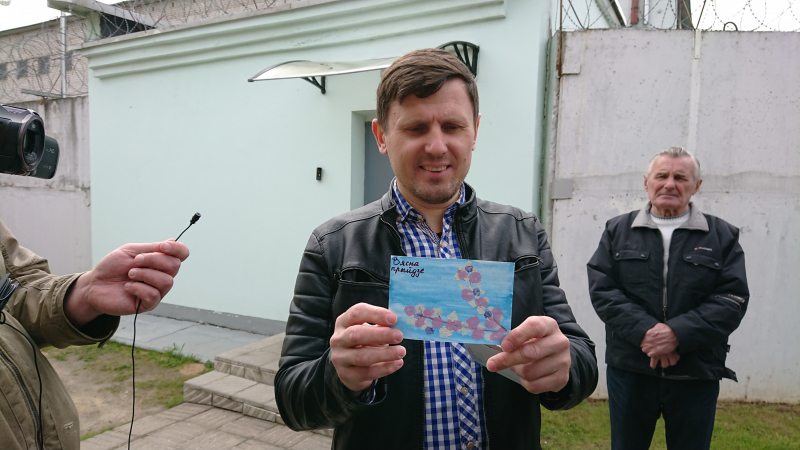
- Aliaksandr Burakou shows a solidarity postcard he receieved while in prison. Photo by Aliaksei Kolchyn
On August 10, Alieh Matskievich, an observer of "Human Rights Defenders for Free Elections" from Barysaŭ, was detained when he went to the election commission to receive an appeal on a complaint which he had previously filed. After a while, he was released.
During the presidential election campaign, Viasna activists and long-term campaign observers Alena Masliukova from Svietlahorsk, Uladzimir Vialichkin from Brest, Ales Kaputski from Maladziečna were subjected to arbitrary detention.
Criminal prosecution under defamatory articles
In 2020, criminal proceedings were initiated against three Viasna human rights defenders under Articles 188 (defamation) and 189 (insult) of the Criminal Code. Human rights defenders from Biaroza, Svietlahorsk and Rečyca – Tamara Shchapiotkina, Alena Masliukova and Andrei Miadzvedzeu – were persecuted.
On August 28, based on the information posted in the group "Honest People of Biaroza", a criminal case was initiated against Tamara Shchapiotkina, a human rights activist of Viasna, under Articles 188 (defamation) and 189 (insult) of the Criminal Code.
After the investigation, initiated at the request of a Biaroza resident who was allegedly humiliated by Shchapiotkina on the internet, and based on other materials, a decision was made not to start a criminal case for lack of evidence of a crime in the actions of the human rights activist. However, two months later, the Biaroza District Prosecutor's Office unexpectedly contested the decision to close the criminal case and ordered an additional check with forensic linguistic expert review. Again, no evidence of a crime was found. On October 30, Tamara Shchapiotkina found out that the criminal case had been closed for the second time, for lack of corpus delicti, since the names of those who took the "insult and defamation" personally were not mentioned.
But on November 12, her apartment was again inspected as part of the criminal case under Articles 188 (defamation) and 189 (insult) of the Criminal Code. Her computer equipment and notebooks were taken from her home.
In May, Rečyca police carried out an inspection at the apartment of Andrei Miadzvedzeu, a Viasna human rights defender, about insulting the editor of a district newspaper, due to a comment the journalist had made on social media. However, no grounds to initiate criminal proceedings against the human rights defender were found.
In April this year, a criminal case was also initiated under Article 189 of the Criminal Code (insult) against Alena Masliukova, a Viasna human rights defender from Svietlahorsk. As part of an inspection of the human rights defender's home, a laptop and a smartphone were seized. The case lasted for a month, but then it was closed.
Persecution of Svietlahorsk human rights defender Aliena Masliukova
This inspection is not the only instance of Alena Masliukova's persecution. During the election and post-election period, she was subjected to pressure from the authorities more than others. Since the beginning of the election campaign in Belarus, three administrative reports have been drawn up against Elena under Art. 23.34 of the Code of Administrative Offences (participation in an unauthorized mass event), for which she was fined 2160 rubles, she was repeatedly detained and kept in a detention facility. During the election campaign, Alena Masliukova was a long-term observer for the "Human Rights Defenders for Free Elections" campaign.
The Svietlahorsk policemen drew up the first report against her because on May 31 the human rights activist photographed the participants of an action with the poster "Freedom to Siarhei Tsikhanouski", which took place in the local square. Alena Masliukova did not take part in the action itself; she monitored the peaceful assembly as an observer of Human Rights Defenders for Free Elections. But the police and the court did not think so. She was recognized as a participant in the action and fined 30 base values (810 rubles) under Art. 23.34 of the Code of Administrative Offences.
The second report under Art. 23.34 of the Code of Administrative Offences against Alena Masliukova was allegedly drawn up for taking part in the action after the pre-election picket of Sviatlana Tikhanouskaya on July 26. But Viasna human rights activist just observed the event. For that incident, she was detained only on the main voting, August 9. The police drew up a report against her, and the human rights activist was kept in the detention facility for over a day. Alena herself believes that the police searched for grounds to isolate her so that she would not have the opportunity to observe the election process. She was kept in the temporary detention facility until 6 p.m. the next day. Then they released her, sending the case for further revision.
The third report under Art. 23.34 of the Code of Administrative Offences accused the Viasna human rights activist of monitoring a peaceful assembly on August 24. At that time, the residents of Svietlahorsk collected signatures asking for permission to hold mass events in the town and under a petition to a deputy of the House of Representatives. The police immediately dispersed the participants of the signature collection process; Alena Masliukova was just observing the situation, staying away from the activity. At once she was accused of participating in an unauthorized action, and the accusation report was rewritten several times due to errors. On September 1, the court fined the human rights activist of Viasna 50 basic units.
Also, Alena Masliukova has been facing threats, arbitrary detention, and other forms of pressure from the local authorities in Svietlahorsk.
Other forms of persecution of Viasna activists
The Belarusian authorities also use other forms of pressure and persecution against members and volunteers of the Human Rights Center "Viasna" . For instance, administrative persecution under Art. 17.1 of the Code of Administrative Offences – "Disorderly conduct".
On October 30, while observing the trials of detained demonstration participants in the Maskouski District Court, Aliaksandr Paplauski, a Viasna volunteer, was detained. He was accused under Article 17.1 of the Code of Administrative Offences (disorderly conduct) of allegedly refusing to leave the courtroom on the order of a judge during a break in the court session. As a result, Aliaksandr Paplauski was detained until the case was examined by the court and spent three days at the Center for the Isolation of Offenders. On November 2, the court of Maskouski District in Minsk postponed the consideration of his case to November 17, and Aliaksandr was released. At the hearing on November 17, a police guard at the Maskouski District Court acted as a witness. He noted that the report which was drawn up on the day of Aliaksandr’s detention by this very policeman, contained erroneous information about the policeman, and the signature on the report was not his signature. Taking into account these obvious violations, the court sent the case to the District Directorate of Internal Affairs for further revision. It is unknown whether the case will return to the court.
On February 22, Aliaksandr Vaitseshyk was detained in Niasviž when he came to a meeting arranged by the Snou agricultural plant as a confidante of a former worker of the plant, pensioner Viachaslau Syrytsa.
The human rights defender planned to represent the interests of Syrytsa, since at the meeting they intended to resolve the issue of excluding Syrytsa from the agricultural plant and depriving him of the “honorary worker” title. However, the vigilantes and police standing at the entrance of the hall did not allow Aliaksandr Vaitseshyk to enter the room, although he had a power of attorney letter with him. The conflict ended with the detention of the human rights defender. He was accused of disorderly conduct. Almost two months later, the human rights defender was fined ten basic units (270 rubles). Later, the Prosecutor's Office made a submission to the head of the Niasviž District Directorate of Internal Affairs to eliminate violations of the law committed by the policemen while preparing the case of the human rights defender. M. Khvitsko, a senior district police officer, was warned that he would be subject to disciplinary liability if similar violations were to recur in the future. Police major A. Salennik was ordered to have better control over his subordinates carrying out the administrative process.



